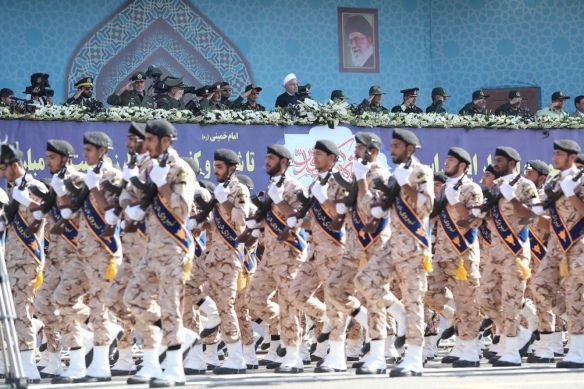In interview with Washington Post, head of US Central Command also says America will retain ‘military platform’ in Iraq
The leader of the US Central Command, which oversees Washington’s military operations in the Middle East, said Iran “will respond” to a recent spate of explosions and fires at its nuclear and industrial facilities that have been blamed on Israel.
In an interview with Washington Post columnist David Ignatius published on Thursday, General Kenneth McKenzie predicted a possible crisis erupting between the Islamic Republic and Israel.
“My experience with Iran tells me they will respond,” McKenzie was quoted as saying.
Early in July, an explosion hit the Natanz enrichment facility, causing significant damage to the nuclear site about 300km south of Tehran. Days later, a blast killed two in an industrial zone in the capital.
A string of mysterious fires and explosions has followed, including incidents that damaged an aluminum factory in the industrial city of Lamerd, a shipyard in the port city of Bushehr and a petrochemical plant in southwestern Khuzestan province.
Iranian officials have declared some of the fires to have been accidents, but they have also suggested that Israel or the United States may be behind the Natanz blast.
“Responding to cyber attacks is part of the country’s defence might. If it is proven that our country has been targeted by a cyber attack, we will respond,” Iran’s civil defence chief Gholamreza Jalali told state TV early in July.
State news agency IRNA also published an article addressing the possibility that sabotage by “enemies” may be behind the blasts.
“So far, Iran has tried to prevent intensifying crises and the formation of unpredictable conditions and situations,” IRNA said.
“But the crossing of red lines of the Islamic Republic of Iran by hostile countries, especially the Zionist regime and the US, means that strategy… should be revised.”
The New York Times this month cited a Middle Eastern intelligence official saying a “powerful bomb” planted by Israel was responsible for the Natanz attack.
The Post’s Ignatius said constantly renewed crises in the Middle East were making it difficult for the US military to fulfil the wishes of President Donald Trump in leaving the region.
McKenzie, who recently toured the region before returning to Al Udeid Air Base in Qatar, confirmed to the newspaper that the US still has a significant number of troops in Iraq and Syria, where Trump has been pushing for a withdrawal.
According to the general, 500 US soldiers remain in war-torn Syria, mostly in the at-Tanf desert base near the Jordanian border. Meanwhile, 5,000 are in Iraq – despite the protests of some Iraqi politicians.
In January, following the killing of top Iranian general Kassem Soleimani by a US drone strike in Baghdad, the Iraqi parliament passed a resolution calling for the withdrawal of American soldiers.
McKenzie said he was confident that the United States would retain a “military platform” in Iraq, albeit with fewer troops.
The general also stressed that Washington remained the main military partner for governments in the region, despite the apparent rapprochement of some Middle Eastern countries with Russia and China.
“If you want to get good stuff, you get ours,” he said, referring to US weapons and training.
No comments:
Post a Comment